Here are the rules: Post the first sentence of your first blog post of each month. You can also add a favorite picture from each month.
I added my own little twist by including a quote cited on my blog for each month.
January:
Kate and Frank got cute little Christmas clearance apron and chef hat sets.

We may distinguish two types of knowing: one is particular, specific, thing-centered, while the other is fundamental, deep, ultimate, person-centered. Examples of the first are the molecular structure of water, the sum of the angles of a triangle equaling 180 degrees, the location of Chile in South America and the defeat of Napoleon at Waterloo. Examples of the second are moral decisions, the ultimate purpose in life, the thirst of men for happiness and the quest for God.
The research-study model for the attainment of truth is effective for the first level of knowing. A proud, avaricious, lustful person can through sheer study reach an extensive knowledge of things. He can learn precious little about persons, nothing about God - nothing, that is, that transcends the mere data level of books and lectures.
Deep, ultimate, person-centered knowledge is achieved through love, genuine love. And love is achieved only through conversion from an opacity resulting from the original fall. (from Authenticity, by Fr. Thomas Dubay)
February:
Some thoughts swirling around in my head - nothing resembling a "train of thought" here, I think! ;)

It is not surprising that it should now be felt that a view, a decision, a conviction are imperatively needed. But it is plainly only in the consideration of Beowulf as a poem, with an inherent poetic significance, that any view or conviction can be reached or steadily held. For it is of their nature that the jabberwocks of historical and antiquarian research burble in the tulgy wood of conjecture, flitting from one tum-tum tree to another. Noble animals, whose burbling is on occasion good to hear; but though their eyes of flame may sometimes prove searchlights, their range is short. (Tolkien on Beowulf)March:
I have no idea when the last time was that I went an entire week without posting on Studeo.

Thomas says that through the praise of God man ascends to God. Praise itself is a movement, a path; it is more than understanding, knowing and doing - it is an "ascent", a way of reaching him who dwells amid the praises of the angels. Thomas mentioned another factor: this ascent draws man away from what is opposed to God. Anyone who has ever experienced the transforming power of great liturgy, great art, great music, will know this. Thomas adds that the sound of musical praise leads us and others to a sense of reverence. It awakens the inner man... (Cardinal Ratzinger, Feast of Faith)
April:
Sometimes I worry that I'm not doing enough with my little ones.
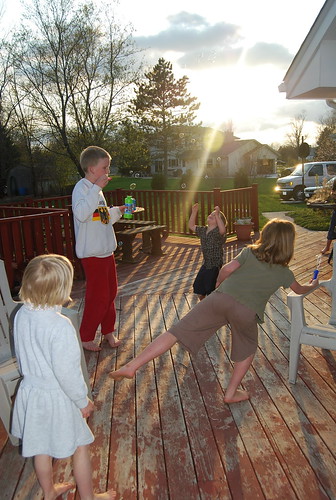
Because the Pope is a witness of Christ and a minister of the Good News, he is a man of joy and a man of hope, a man of the fundamental affirmation of the value of existence, the value of creation and of hope in the future life. Naturally, this is neither a naive joy, nor a vain hope. The joy of victory over evil does not obfuscate - it actually intensifies - the realistic awareness of the existence of evil in the world and in every man. The Gospel teaches us to call good and evil by name, but it also teaches: "Do not be conquered by evil but conquer evil with good." (Pope John Paul II, Crossing the Threshold of Hope)
May:
Another photo by Ria.
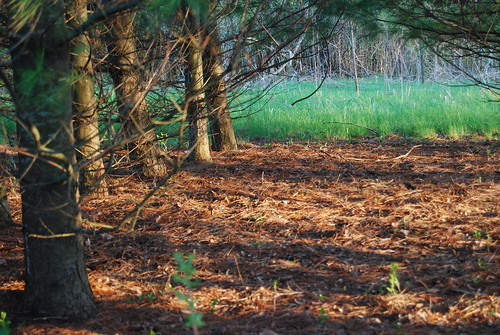
Therefore, these two aspects - the affirmation of the person as a person and the sincere gift of self - not only do not exclude each other, they mutually confirm and complete each other. Man affirms himself most completely by giving of himself. This is the fulfillment of the commandment of love. This is also the full truth about man, a truth that Christ taught us by His life, and that the tradition of Christian morality, no less than the tradition of saints and of the many heroes of love of neighbor, took up and lived out in the course of history.
If we deprive human freedom of this possibility, if man does not commit himself to becoming a gift for others, then this freedom can become dangerous. It will become freedom to do what I myself consider as good, what brings me a profit or pleasure, even a sublimated pleasure. If we cannot accept the prospect of giving ourselves as a gift, then the danger of a selfish freedom will always be present.... a complete expression of all this is already found in the Gospel. For this very reason, we can find in the Gospel a consistent declaration of all human rights, even those that for various reasons can make us feel uneasy. (from Crossing the Threshold of Hope by Pope John Paul II)
June:
After many years of getting mostly odd comments at grocery stores about our noticeably large bunch of kids, I tend to savor the funny or overtly positive comments related to shopping trips with the gang in tow.
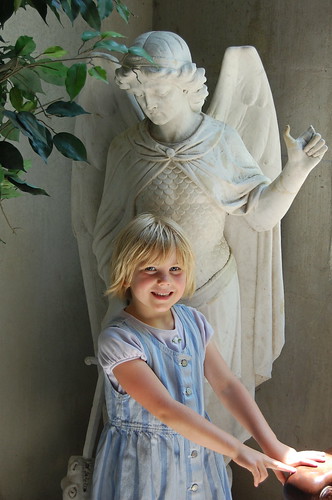
The only Christian work is good work done well. Let the Church see to it that the workers are Christian people and do their work well, as to God: then all the work will be Christian work, whether it is Church embroidery, or sewage-farming. As Jacques Maritain says: 'If you want to produce Christian work, be a Christian, and try to make a work of beauty into which you have put your heart; do not adopt a Christian pose.'He is right. And let the Church remember that the beauty of the work will be judged by its own, and not by ecclesiastical standards. Let me give you an illustration of what I mean.
When my play The Zeal of Thy House was produced in London, a dear old pious lady was much struck by the beauty of the four great archangels who stood throughout the play in their heavy, gold robes, eleven feet high from wing-tip to sandal-tip. She asked with great innocence 'whether I selected the actors who played the angels for the excellence of their moral character?'
I replied that the angels were selected, to begin with, not by me but by the producer, who had the technical qualifications for selecting suitable actors - for that was part of his vocation. And that he selected, in the first place, young men who were six feet tall, so that they would match properly together. Secondly, angels had to be of good physique, so as to be able to stand stiff on the stage for two and a half hours, carrying the weight of their wings and costumes, without wobbling, or fidgeting, or fainting. Thirdly, they must be able speak verse well, in an agreeable voice and audibly. Fourthly, they must be reasonably good actors.
When all these technical conditions were fulfilled, we might come to the moral qualities, of which the first would be the ability to arrive on the stage punctually and in a sober condition, since the curtain must go up on time, and a drunken angel would indecorous. After that, and only after that, one might take character into consideration, but that - provided his behaviour was not so scandalous as to cause dissension among the company - the right kind of actor with no morals would give a far more reverent and seemly performance than a saintly actor with the wrong technical qualifications.
The worst religious films I ever saw were produced by a company which chose its staff exclusively for their piety. Bad photography, bad acting, and bad dialogue produced a result so grotesquely irreverent that the pictures could not have been shown in churches without bringing Christianity into contempt.
God is not served by technical incompetence; and incompetence and untruth always result when the secular vocation is treated as a thing alien to religion. (from Creed or Chaos by Dorothy Sayers)
July:
Ria managed to post about our California Mission visits in honor of today's feast.

"Always go forward and never turn back..." (a motto of Bl. Junipero Serra)
August:
We had way too much fun taking funny pictures today.

'The manifestation of the glory of Jesus,' to quote Danielou, 'appears to Peter to be the sign that the times of the Messiah have arrived. And one of the qualities of these messianic times was to be the dwelling of the just in the tents signified by the huts of the Feast of Tabernacles'... By experiencing the Transfiguration during the Feast of Tabernacles, Peter, in his ecstasy, was able to recognize 'that the realities prefigured by the Feast were accomplished... the scene of the Transfiguration marks the fact that the messianic times have come'. It is only as they go down from the mountain that Peter has to learn once again that the messianic age is first and foremost the age of the Cross and that the Transfiguration - the experience of becoming light from and with the Lord - requires us to be burned by the light of the Passion and so transformed. (from Jesus of Nazareth by Pope Benedict XVI)
September:
A partial re-posting from April 2007 because we're praying for all those on the Gulf Coast as the horrible hurricane makes landfall...

There are two types of decision makers. Satisficers (yes, satisficers) make a decision once their criteria are met. When they find the hotel or the pasta sauce that has the qualities they want, they're satisfied. Maximizers want to make the best possible decision. Even if they see a bicycle or a backpack that meets their requirements, they can't make a decision until they've examined every option. Satisficers tend to be happier than maximizers. Maximizers expend more time and energy reaching decisions, and they're often anxious about their choices. Sometimes good enough is good enough. (Gretchen Rubin as quoted in RealSimple Magazine)October:
It's homecoming week at a local high school, which includes spirit-oriented dress-up theme days throughout the week.
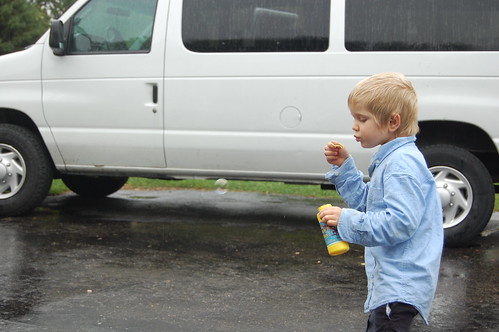
Moral strength has not grown in tandem with the development of science; on the contrary, it has diminished, because the technological mentality confines morality to the subjective sphere. Our need, however, is for a public morality, a morality capable of responding to the threats that impose such a burden on the existence of us all. The true and gravest danger of the present moment is precisely this imbalance between technological possibilities and moral energy. The security we all need as a presupposition of our freedom and dignity cannot ultimately be derived from technical systems of control. It can come only from the moral strength of man, and where this is lacking or insufficient, the power man has will be transformed more and more into a power of destruction. (from Christianity and the Crisis of Cultures by Pope Benedict XVI)
November:
I'm a little behind on these as I've had incredibly packed days lately.

"Go, make disciples of all nations" was the last command Jesus gave to us before returning to His Father. It's a big one. How can simple people like us convert the world? That brings us back to Mary, and to the apostles at Pentecost. They changed the world by letting God change them and work through them. We don't need to be afraid. We need to be confident in the promise made by Christ Himself: "I am with you always, to the close of the age."
Don't be afraid of the world. The poet Percy Bysshe Shelley once sneered that "I could believe in Christ if He did not drag along behind Him that leprous bride of His, the Church." Yet Shelley is long dead, and the Church is still here, still alive and young, still bringing life to the world. Don't be afraid of the world. The Holy Spirit is on your side. Charles Spurgeon once said, "The way you defend the Bible is the same way you defend a lion. You just let it loose." (from Living the Catholic Faith by Archbishop Chaput)
December:
I'll probably have to re-read this book before I can give what I would consider an adequate review.
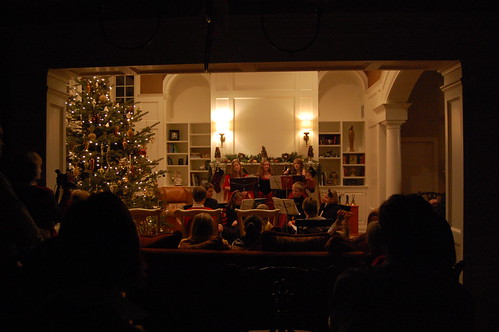
...his first reaction was always gratitude. He accustomed himself, in everything that happened in his life, always first and foremost to praise and to give thanks, even before he knows what it is, in fact, that he has received, even before he accepts what he receives, looks at it, and gives it shape. (from Book of All Saints by Adrienne Von Speyr - chapter on St. Francis of Assisi)

1 comment:
I love the idea of adding a quotation for each month.
Post a Comment